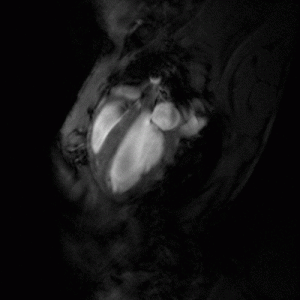 Congestive heart failure (CHF) is a worldwide epidemic. It is estimated, for example, that in Europe around 10 million people are suffering from this disease. Despite some progress in medical treatment within the last 10 years, morbidity and mortality of CHF are still high: 70-80% of patients suffering from heart failure will die within the next 8 years. Heart failure develops mainly after myocardial infarction, chronic arterial hypertension, diseases of the cardiac valves (e.g. aortic valve stenosis), viral myocarditis or genetic disease. Associated with all these different disease entities is a profound alteration of the ventricular shape and function, which is triggered by cardiac overload as well as local and systemic activation of specific cytokines and growth factors. As a final common pathway of almost every heart disease leading to heart failure, the left cardiac ventricle dramatically dilates, while the left ventricular walls become increasingly thinner. This progressive dilation markedly increases wall stress, which in turn leads to further damage to the myocardium and diminishes the capability of the heart to pump blood into the circulation.
Congestive heart failure (CHF) is a worldwide epidemic. It is estimated, for example, that in Europe around 10 million people are suffering from this disease. Despite some progress in medical treatment within the last 10 years, morbidity and mortality of CHF are still high: 70-80% of patients suffering from heart failure will die within the next 8 years. Heart failure develops mainly after myocardial infarction, chronic arterial hypertension, diseases of the cardiac valves (e.g. aortic valve stenosis), viral myocarditis or genetic disease. Associated with all these different disease entities is a profound alteration of the ventricular shape and function, which is triggered by cardiac overload as well as local and systemic activation of specific cytokines and growth factors. As a final common pathway of almost every heart disease leading to heart failure, the left cardiac ventricle dramatically dilates, while the left ventricular walls become increasingly thinner. This progressive dilation markedly increases wall stress, which in turn leads to further damage to the myocardium and diminishes the capability of the heart to pump blood into the circulation.
Our lab study the molecular mechanisms responsible for cardiac hypertrophy and remodeling during heart failure. We showed that the Extracellular Signal-Regulated Kinase (ERK) pathway acts to promote a compensated hypertrophic response, with enhanced contractile function and reduced fibrosis. The activation of this pathway may be a therapeutic strategy in heart failure to preserve contractile function when the pressure overload cannot be easily alleviated.
Paper by Michael Mutlak MD:
Mutlak M, Schlesinger-Laufer M, Haas T, Shofti R, Ballan N, Lewis YE, Zuler M, Zohar Y, Caspi LH, Kehat I. Extracellular signal-regulated kinase (ERK) activation preserves cardiac function in pressure overload induced hypertrophy. Int J Cardiol. 2018 May 24
